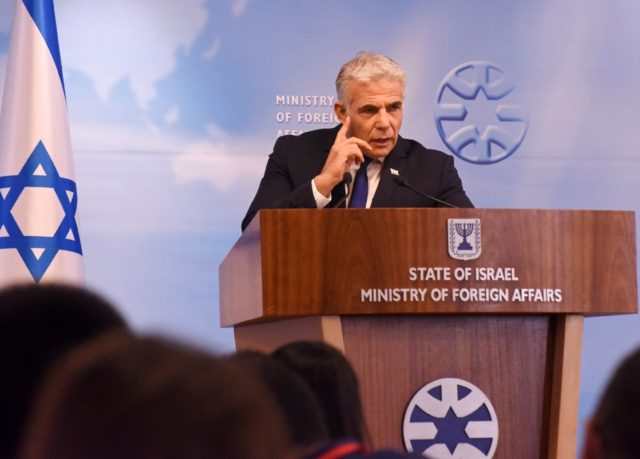Israeli Foreign Minister Yair Lapid said Sunday that Israel was “committed” to the status quo that prevents Jews praying at Jerusalem’s flashpoint Al-Aqsa Mosque compound, the epicentre of repeated clashes.
His comments follow violence in Israel and the Palestinian territories that has killed 38 people since late March, with tensions further fuelled by the clashes in Jerusalem and exchanges of fire between Israel and the Gaza Strip Palestinian enclave.
“Muslims pray on the Temple Mount, non-Muslims only visit,” Lapid said, using the Jewish term for the Al-Aqsa Mosque compound in Israeli-annexed east Jerusalem, the holiest place in Judaism and the third-holiest in Islam.
Palestinian Muslims have been angered by an uptick in Jewish visits to the Al-Aqsa compound, where by long-standing convention Jews may visit but are not allowed to pray.
“There is no change, there will be no change — we have no plans to divide the Temple Mount between religions,” Lapid told journalists.
Palestinian protesters have repeatedly clashed with Israeli riot police at the Al-Aqsa compound since the middle of the month, leaving hundreds injured as the Muslim holy month of Ramadan coincided with Jewish Passover.
Attacks by Palestinians and Israeli Arabs have since late March killed 14 people in Israel, while 24 Palestinians have died, including perpetrators of attacks and also in raids by Israeli security forces in the occupied West Bank.
‘Incitement’
The recent violence in east Jerusalem sparked fears of another armed conflict similar to an 11-day war last year between Israel and the militant group Hamas, triggered by similar unrest at Al-Aqsa.
Late Sunday, Israeli Prime Minister Naftali Bennett spoke with US President Joe Biden and “updated him on the efforts to stop the violence and incitement in Jerusalem”, a statement from the premier’s office said.
Biden accepted a prior invitation by Bennett to visit Israel and said during the call that he would do so in “the coming months”, the statement added.
Palestinian officials and militants have repeatedly accused Israel of seeking to divide Al-Aqsa into Jewish and Muslim sections, as with another sensitive holy site in nearby Hebron.
They have voiced anger at repeated incursions by Israeli security forces into the mosque compound.
But Lapid accused Hamas — which rules Gaza — and Islamic Jihad of sending “extremists” with weapons and explosives to use the Al-Aqsa compound “as a base to incite violent riots”.
“The only reason police have entered the mosque in recent weeks is to remove them,” he added.
‘Fear is there’
Israel said Saturday it would close its only crossing from Gaza for Palestinian workers in response to overnight rocket fire from the besieged territory, but this time stopped short of carrying out retaliatory strikes.
Days earlier, Israel had hit Gaza with air strikes following incoming rocket fire.
Late Sunday, an Israeli source told AFP on condition of anonymity that the crossing would remain closed on Monday too.
Defence Minister Benny Gantz meanwhile warned “terror groups” that “those whose economic, civilian and military situations are not stable will be the ones hurt by any unrest”.
Analyst Ofer Zalzberg noted that Palestinians had been angered by reports on social media that Israel had decided to divide the Al-Aqsa Mosque compound.
“The fear is there and it is very important… whether it is true or not,” said Zalzberg, Middle East head at the Herbert C. Kelman Institute.
He said Hamas was divided between its leadership in Gaza, who want to stay out of the escalation after being pounded by Israeli strikes during last year’s war, and those who see the tensions at Al-Aqsa as an “ideological opportunity… (to) make progress with the West Bank and Jerusalem”.
Egypt’s President Abdel Fattah al-Sisi met Sunday with Jordan’s King Abdullah II and Abu Dhabi Crown Prince Mohammed bin Zayed in Cairo, where they discussed the situation in Jerusalem, according to Sisi’s spokesman.
The leaders of the three countries — all of which have diplomatic ties with Israel — urged further “efforts to restore calm and to preserve… the historical status quo” at Al-Aqsa, while calling on Israel to “cease measures that undermine (prospects for) a two-state solution”.

COMMENTS
Please let us know if you're having issues with commenting.